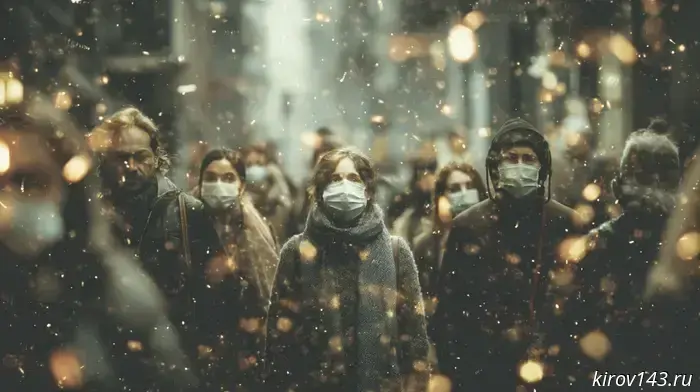
The virus is approaching: how to prepare for flu season and prevent complications.
Epidemiological plan
According to epidemiologists, to contain the spread of the virus at least 60% of the population and 75% of those in risk groups must be vaccinated. To date, about 35% of the planned number of people have been vaccinated.
"When planning trips abroad, we recommend reviewing the epidemiological situation on Rospotrebnadzor's resources and assessing the risk of infection. If necessary, you should get vaccinated in accordance with the requirements of the destination country," epidemiologists advise.
Safety measures: effective protection
Infectious disease physician Rustam Tavabilov listed the most effective preventive measures:
Vaccination — the only reliable means of protection against influenza and its complications.
Vaccination should be done annually; the optimal time is from September to November.
Hand hygiene — frequent and thorough washing with soap or use of hand sanitizers.
Avoiding contact with sick people and crowded places.
Respiratory etiquette — use of masks when ill (change every 2 hours), covering the mouth with the elbow when coughing.
Regular ventilation of rooms to help keep mucous membranes moist.
Supporting the body: what really works
Experts emphasize that no folk remedy can replace vaccination, but some methods help relieve symptoms:
Warm drinks (tea with lemon, ginger, honey)
Cranberry or lingonberry fruit drink as a source of vitamin C
Nasal irrigation with saline solution
To support immunity during the cold season, it is important to pay attention to:
Vitamin D — plays a key role in immune system function
Vitamin C — may reduce the duration and severity of symptoms
Zinc — an important element for immunity
Special cases: children and pregnant women
Pediatrician Elvira Kinzya gulova notes: "Children are the 'engine' of the epidemic. In addition to vaccination, it is critically important to teach a child respiratory etiquette."
Influenza is especially dangerous for pregnant women. "Pregnancy is a state of controlled immune suppression. Vaccination is not only safe but also provides protection for the child during the first 6 months of life," the expert is quoted by the MediaKorSet news agency.
When to sound the alarm: "red flags"
Physicians list symptoms that require immediate assistance:
Shortness of breath, chest pain, bluish lips
Temperature above 39°C not reduced by medications
Confusion, severe headache
No improvement by the fifth day of illness
Important for patients with chronic conditions
For patients with chronic illnesses, influenza poses a particular danger. "Vaccination for them is not merely a matter of prevention but of reducing the risk of death. Ongoing control of the underlying condition and prompt medical attention are necessary," emphasizes the infectious disease specialist.
Self-treatment of influenza is unacceptable — at the first symptoms you should see a doctor to receive appropriate treatment and prevent complications.
Другие Новости Кирова (НЗК)
 It is now known whether traffic jams are expected on October 20.
The regional traffic police in Kirov Oblast reported on road congestion on Monday.
It is now known whether traffic jams are expected on October 20.
The regional traffic police in Kirov Oblast reported on road congestion on Monday.
 The governor suggested using insurance to address the problems of fire victims.
At a government meeting, they discussed the risks of fires.
Fishermen in Kirov are being asked to help provide food for a sick sea eagle.
The bird eats only small river fish and turkey.
The governor suggested using insurance to address the problems of fire victims.
At a government meeting, they discussed the risks of fires.
Fishermen in Kirov are being asked to help provide food for a sick sea eagle.
The bird eats only small river fish and turkey.
 Employers in Kirov Oblast posted 19,000 vacancies during the quarter.
Analysts at hh.ru reviewed the results of the third quarter of 2025 and identified which professions are most in demand in the Kirov Oblast today. Employers in the region posted more than 19,000 vacancies between July and September — ranging from blue-collar roles to office positions.
Seasonal blues: a survival guide
Low mood, unexplained sadness, lethargy and apathy — all are common companions of the changing seasons. When bright summer gives way to gray days and shorter daylight hours, many people feel a loss of energy.
Employers in Kirov Oblast posted 19,000 vacancies during the quarter.
Analysts at hh.ru reviewed the results of the third quarter of 2025 and identified which professions are most in demand in the Kirov Oblast today. Employers in the region posted more than 19,000 vacancies between July and September — ranging from blue-collar roles to office positions.
Seasonal blues: a survival guide
Low mood, unexplained sadness, lethargy and apathy — all are common companions of the changing seasons. When bright summer gives way to gray days and shorter daylight hours, many people feel a loss of energy.
 Kirov residents will pay 855 million on income from deposits
Kirov residents will pay 855 million on income from deposits
Kirov residents will pay 855 million on income from deposits
Kirov residents will pay 855 million on income from deposits
The virus is approaching: how to prepare for flu season and prevent complications.
Flu season is approaching — in most regions the peak in cases is expected in December–January. Medical professionals predict that the first cases will appear as early as the beginning of winter, and the virus will be most widespread by March. Experts urge people to prepare in advance for the epidemic season and remind them of the importance of vaccination.
